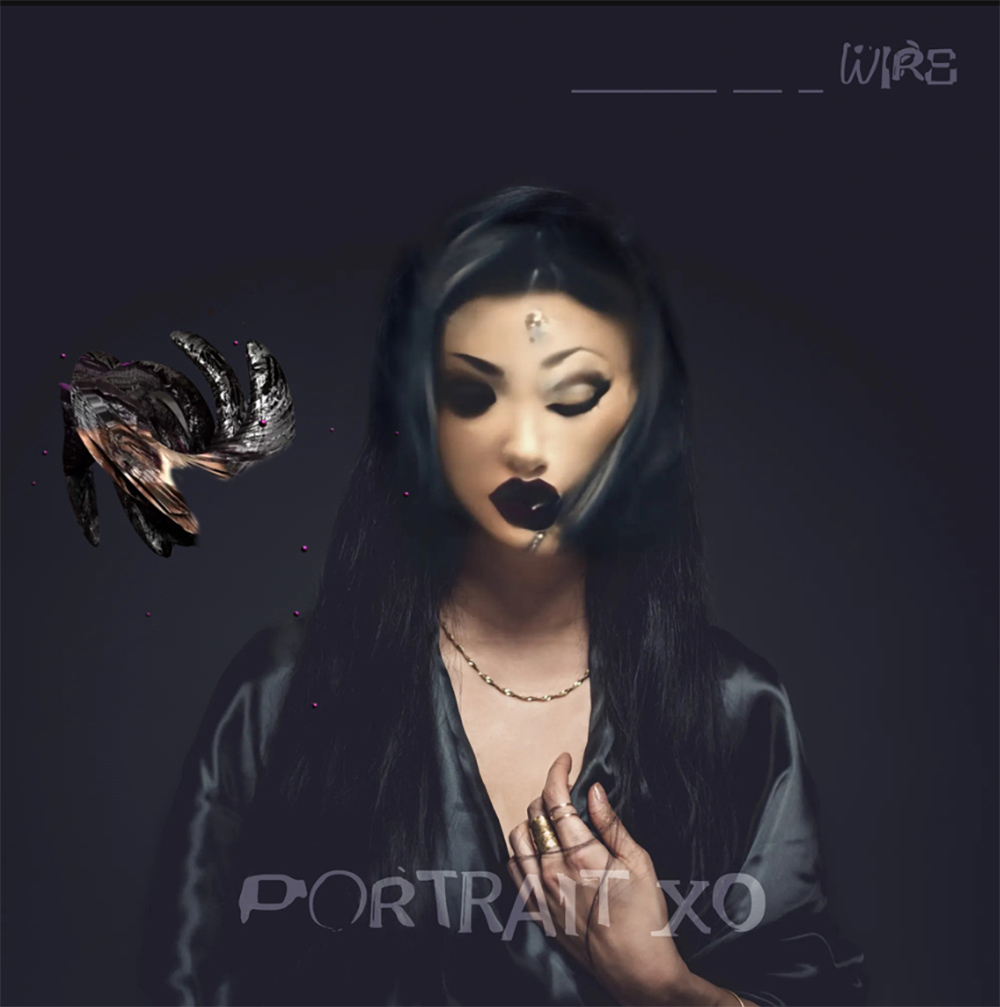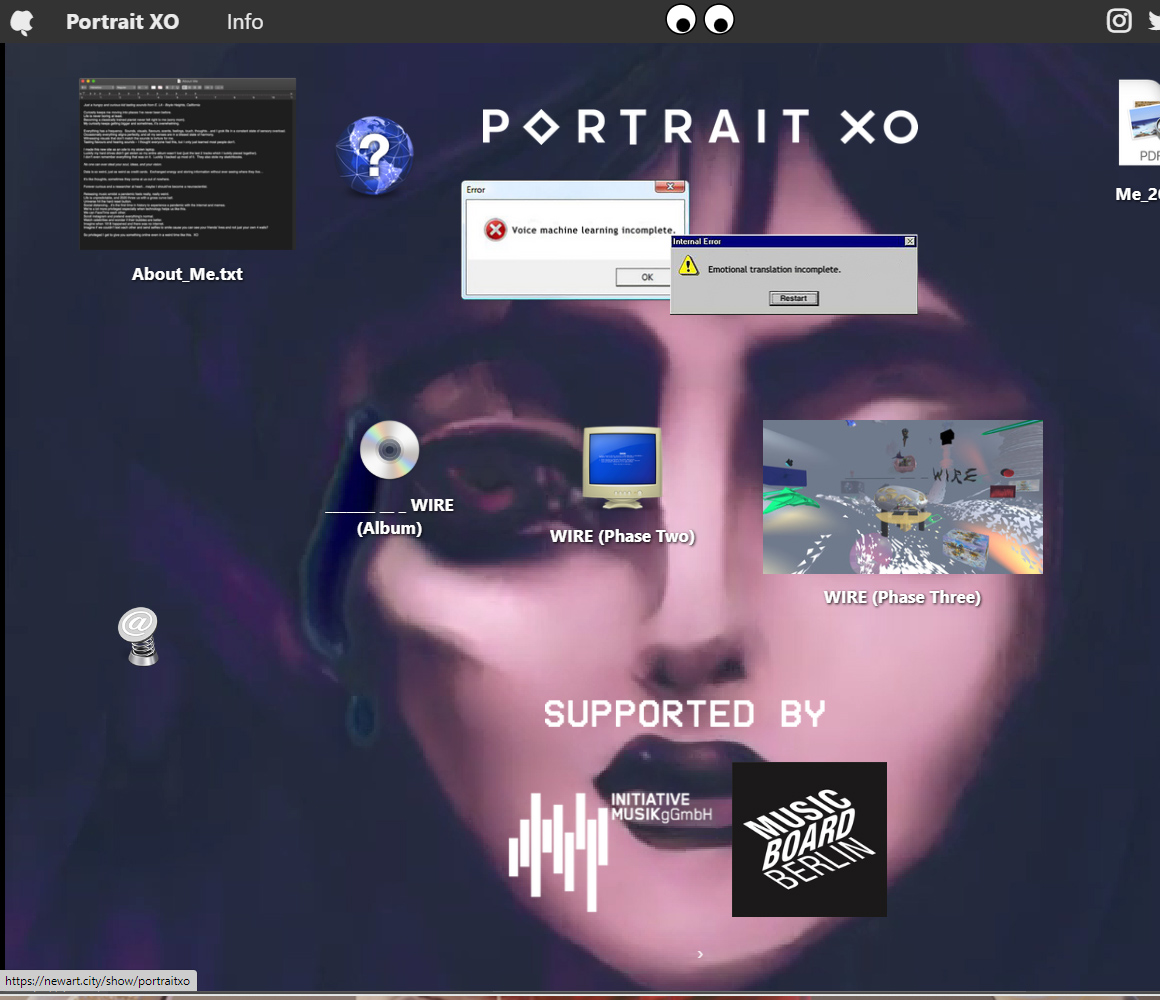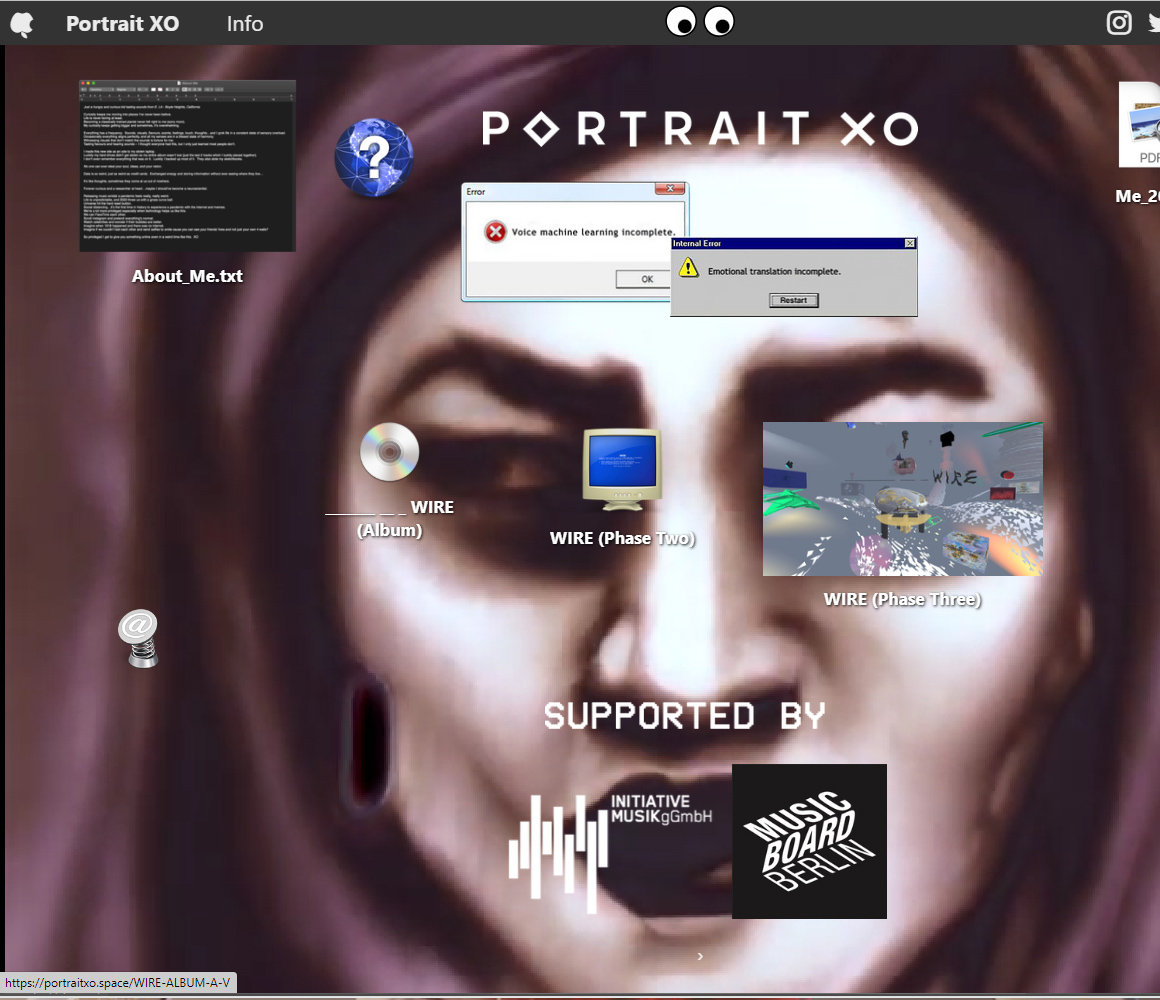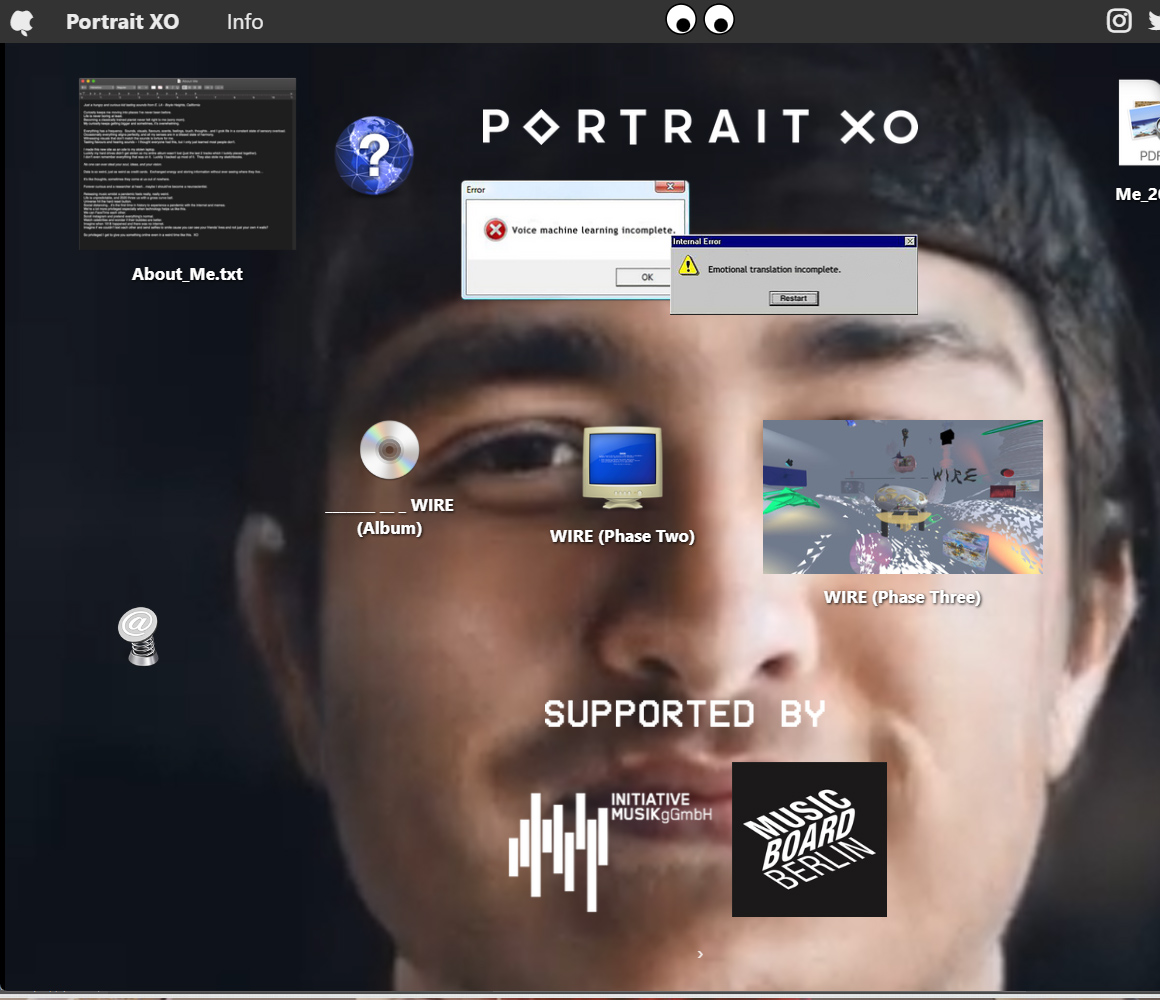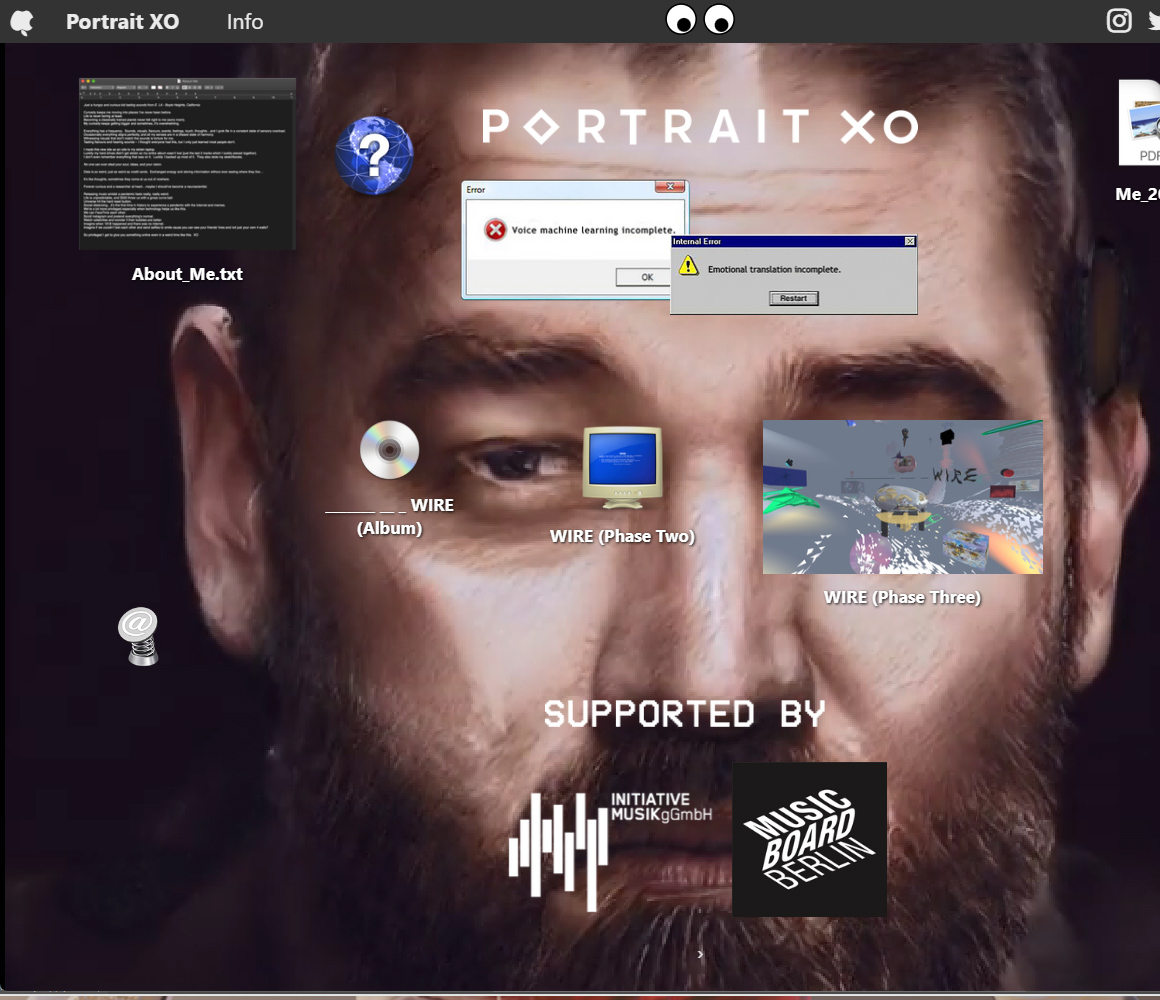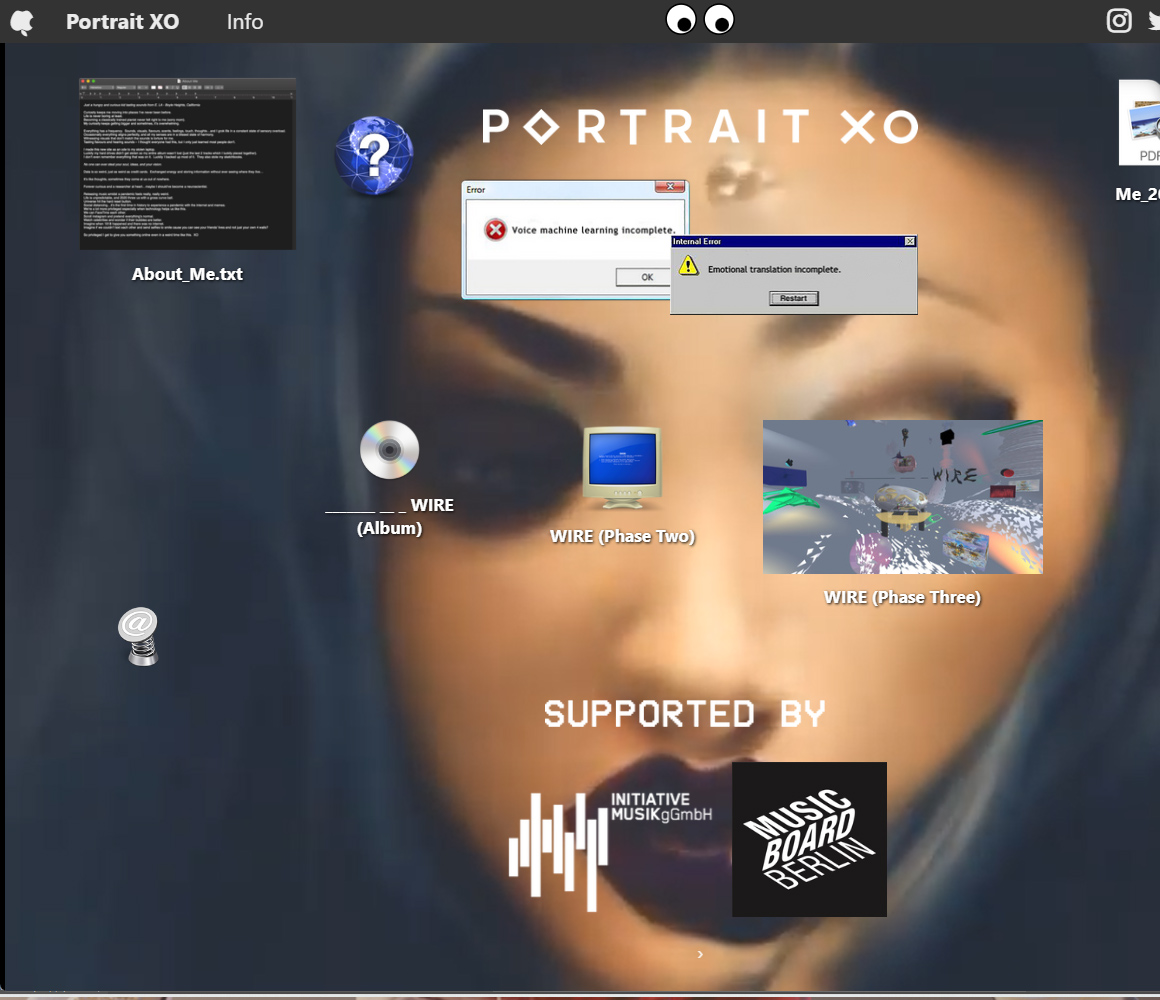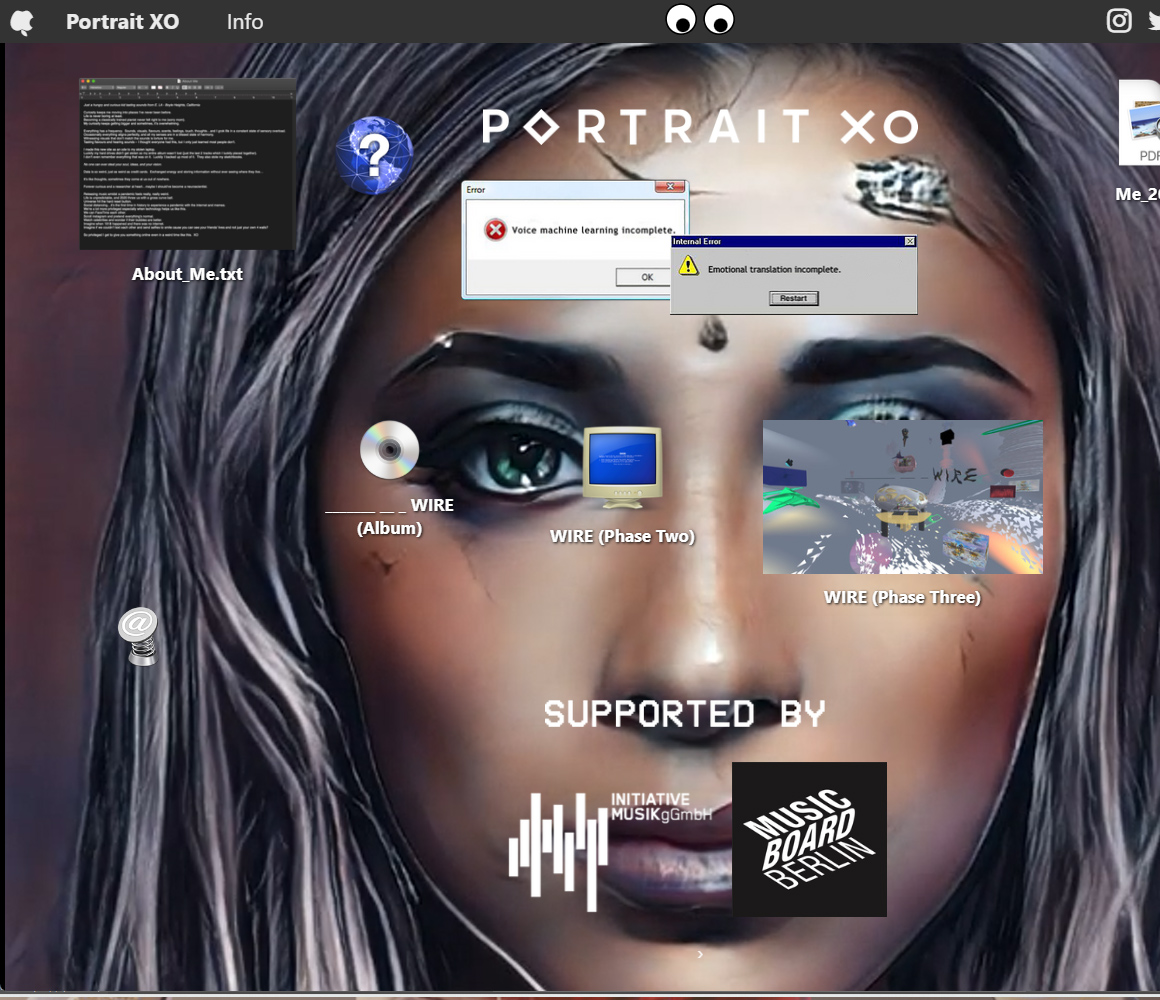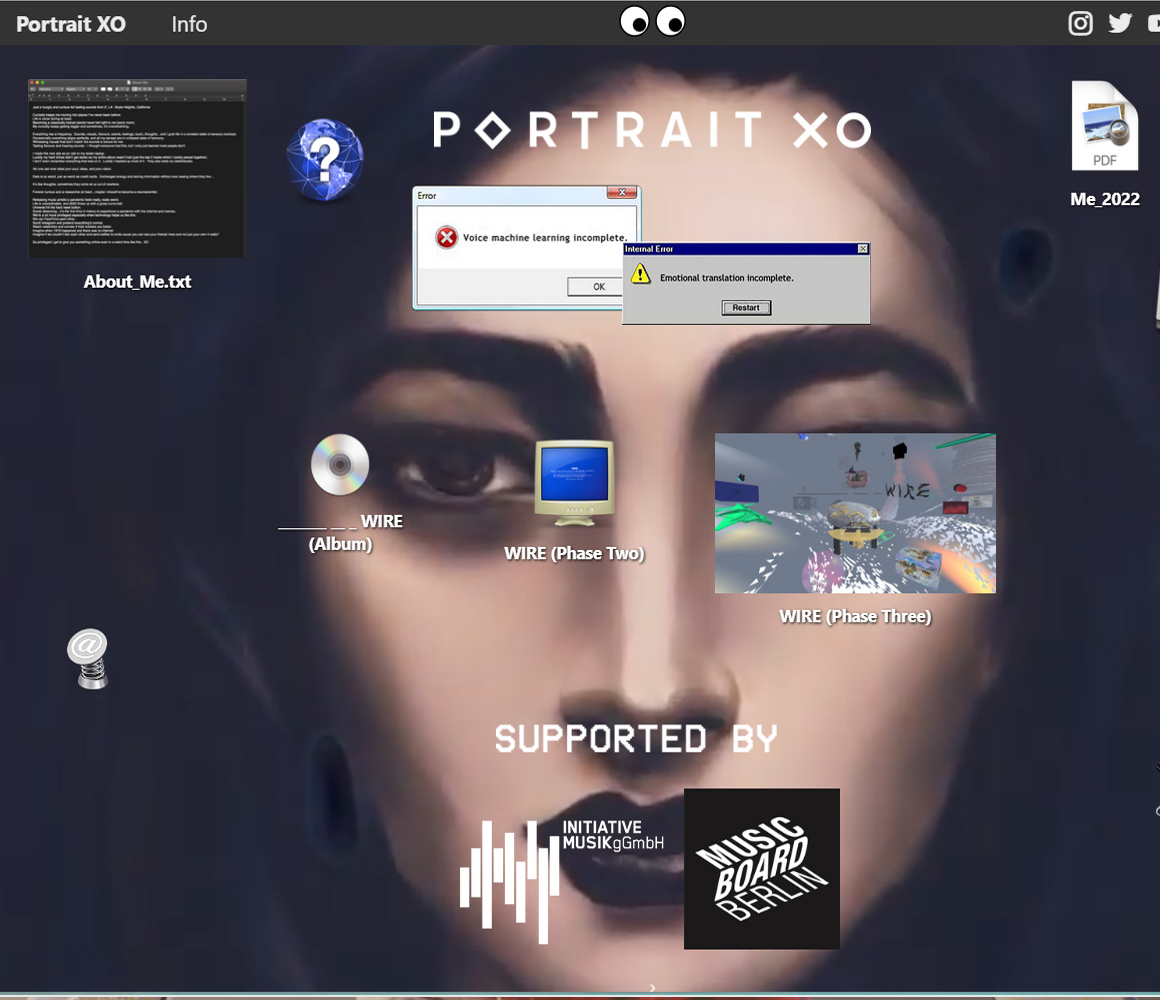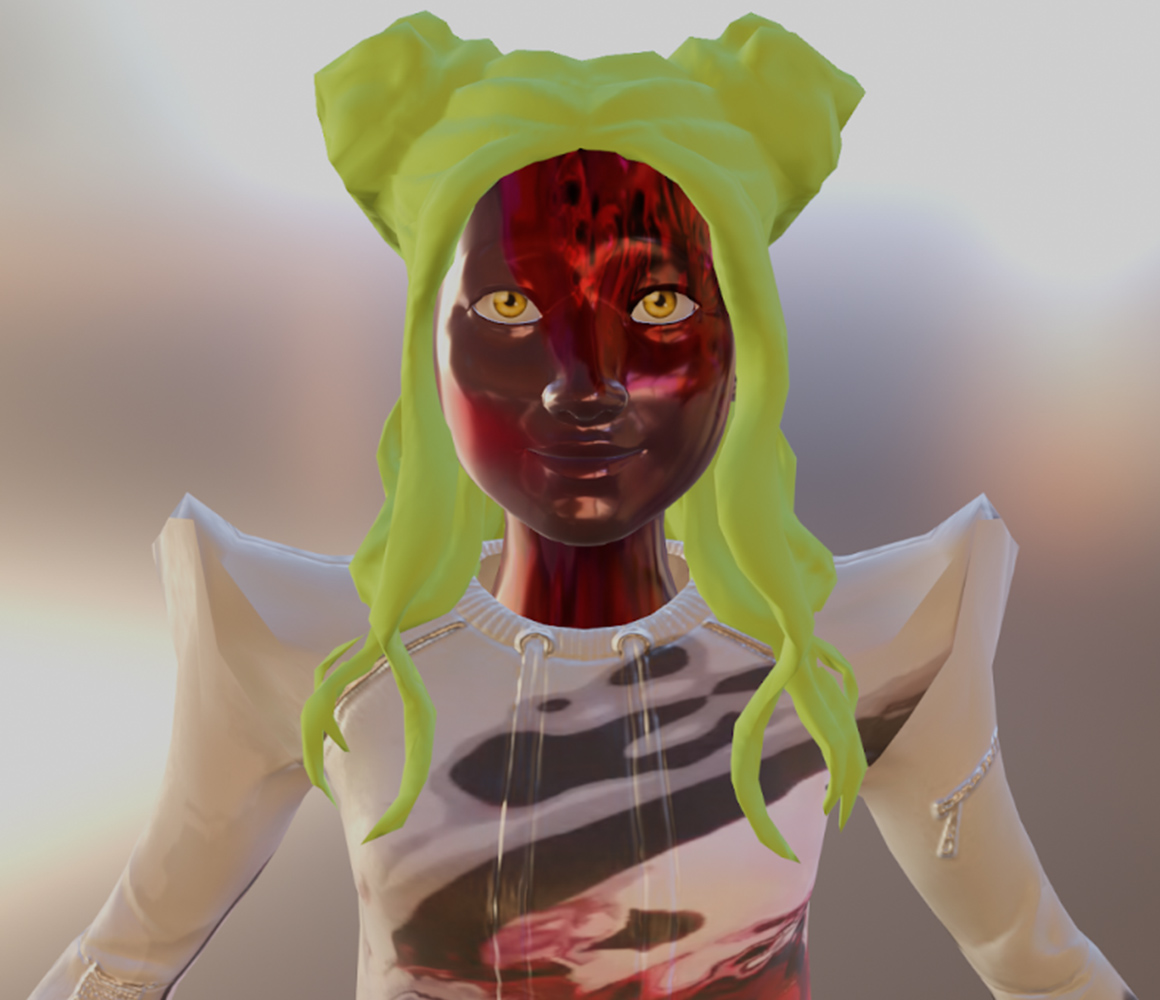PORTRAIT XO
hybrid music artist exploring AR/VR/XR/AI
US / Germany
„Most creative use of A(rtificial) I(ntelligence)“! On that reason this Asian-American female and her collaborators, the American duo Dadabots, won the „Best Experiment“ award at the ‚1st Eurovision AI Song Contest‘ in 2020 with their song „I’ll Marry You, Punk Come“. The faceted creative is active in a very complex field: „Research and execution between science, art, music, and technology. Workshops, presentations, and interactive installations.“ In short: „Exploring (computational) creativity with sound, AI, and new media.“ But that’s not all, she says: „Conceptualizing experiences from synaesthetic reactions between sound-taste-visual.“ Such descriptions seem very scientific and futuristic, but the driving force for her is finding answers to an elemental question: „What does it mean to be human in today’s data-driven society?“
PORTRAIT XO
hybrid music artist exploring AR/VR/XR/AI
US / Germany
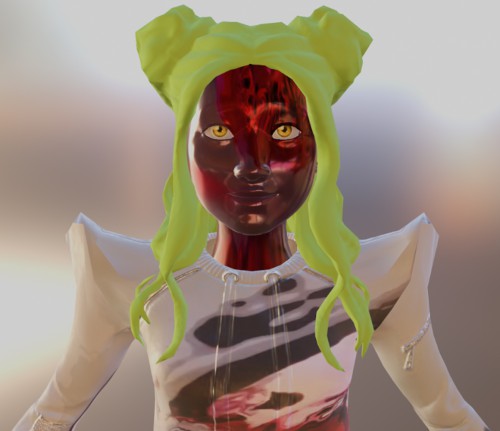
From classical piano training to hightech electronic equipment: the artistic path that Rania Kim alias Portrait XO undertook is an unusual one but represents her development well. „I started my journey in music with classical piano at age 4“ (in her birthplace of Los Angeles), she told voyagela.com. „I quit piano lessons at age 15 to discover my own sound, moved to London for a while, and came back to LA with new perspectives on sound. Living in London for 9 years was the boldest and best thing I’ve ever done. UK living introduced me to a whole new world of electronic music and innovative music technology.“ The thanks of this forward thinker go to Radiohead, Björk, Aphex Twin and Massive Attack. „Aside from songwriting and producing, I’m obsessed with art, science, technology, and humanity. After discovering what synaesthesia was, it’s opened up interesting new ways of expressing myself creatively. I love the science of sound and am excited about creating more synaesthetic experiences for people. I would’ve never imagined making sound installations about my synaesthesia and giving people synaesthetic dining experiences where I get to perform musical translations of how I hear sounds from flavors.“ Her creative journey is an impressive one: In 2018 for example she worked with the UN and ShareTheMeal on a refugee project for ‚World Food Day‘. „Our campaign goal was to break stereotypes based on local learning and engagement through art and music“, Portrait XO mentioned in an interview with factoryberlin.com. „Soon, I’d like to create an AI-based multicultural social experiment with protective barriers, translations, and transparent reactions. One of my favorite experiments with huge impact was the governmental social media campaign ‚Curators of Sweden‘.“ The same year Portrait XO was booked to speak and perform at the renowned ‚Cannes Lions International Festival of Creativity‘.
In 2019 at ‚TOA‘ (‚Tech Open Air‘), Europe's Leading Technology Festival, she presented – as part of the Arts programm - a HoloLens A(ugmented) R(eality) installation in collaboration with Indian illustrator/graphic designer Opashona Ghosh. In December the song ‚AIV1‘ granted her the ‚AI Mozart Prize‘ at ‚Beats & Bits‘ (Berlin) - the world's first music competition for artificial intelligence.
Being a singer/songwriter/producer she teamed up with Italian composer Gadi Sassoon, neurologists, and EEG headsets with sensors to translate brainwaves into beats „with my vocals, layered with effects triggered by brainwave feedback.“ Winning the grand prize for top AR at University Of Southern California’s ‚Creating Reality Hackathon‘ (= programmers, designers & co. collaborate on software projects) recently was a another success.
Mid 2022 saw the release of ‚WIRE‘. „The title of the album is named after the process that was born out of the experiment that happened during co-creation with raw AI audio generated audio out of my voice. ‚WIRE‘ is my human input to finish the AI generated phrase.“ It is the debut-album of the founder of the Hybrid Arts Community/label ‚Sound Obsessed‘, co-founder of ‚Co:Quo‘, an art + activism collective of multi/trans/interdisciplinary creatives collaborating internationally, and founding member of ‚The IASAS‘ (The International Association of Synaesthetes, Artists, and Scientists). „I love connecting dots between art, science, music, technology, and humanity“, she stated towards voyagela.com. „As a music artist and creative director, I see visuals as a way to communicate ideas and music to communicate emotions. Give me an idea or a problem and I can give you 360-degree multimedia ideas with all the resources to make them happen, with the bonus of an emotional impact through musical storytelling. Whether it’s creating immersive sound installations, dance shows, musical dining experiences, a live musical performance, or helping other artists bring their ideas to life, I love making things happen.“
Portrait XO works and lives in Berlin.
Interview May 2022
Breaking boundaries: adventurous human-machine collaborations
INTUITION & IMAGINATION
How does intuition present itself – being a gut feeling or a suspicious impression?
‘In Zen buddhism, Enso expresses the moment where the mind is free to let the body create.’ I do think intuition is key to everything, and deepening our connection with ourselves internally is how we can tap into great intuition. Intuition for me happens best when I meditate regularly and sustain being extremely present in the moment with all my senses. Through this heightened awareness of the present moment allows me to physically be in a calm, focused, and highly creative space. From this state of being, I can make the best decisions that are always in alignment to my truths. I think when our minds are distracted by what’s happening around us rather than what’s happening internally, we’re unable to tap into our intuition.
Do you visualise something spontaneously in your mind’s eye - maybe in dreams?
When I meditate, I get myself to a state of complete surrender through slow deep breathing. I usually put out clear intentions of what I would like some help on whether it’s creative problem solving a project I’m working on, or I need more clarity on an idea I’m excited about. The more relaxed and at peace I am, the easier I’m able to allow visuals to surprise me in ways I don’t expect that always help guide me what I need to do next.
Will any ideas be written down immediately and archived?
Yes. I journal regularly and it has been an incredibly useful way for me to stay on track and consistently be in a state of gratitude not just for every idea I’m gifted with but to also be able to create and execute.
What if there is a deadline, but no intuition? Does the first fuel the latter maybe?
I think deadlines help us use intuition in the best possible way. We need deadlines to deliver any idea. Otherwise ideas sit in a timeless soup that swims around taking different forms without a place to be seen, heard, or felt other than existing in the invisible unseen space of a solitary mind. We need set timelines to help us have a healthy relationship with our ideas. It always feels like there’s not enough time or we have too much time. Deadlines create an ongoing flow of input and output. Without them, we get stuck because our ideas stay stuck without movement.
Are great ideas based on intuition or by almost endless trials and errors that result in constant developments up until the final result?
I think both. Our intuition gets better the more we create, execute, and iterate. We build stronger intuition through every iteration simply by doing. I don’t think we’re ever 100% truly satisfied with anything we create, but we do get better through consistent trial and error. And to have a healthy relationship with our work, we have to celebrate each improvement. I also think it’s important to constantly try new things and never get too comfortable with any method, approach, or ways of doing things. I feel I’m a constant work in progress and there’s always something I can improve and do better.
World-famous guitarist Carlos Santana said to me, when the “sky” opens and sends you a brainwave one has to grab that special spiritual moment for realising it before the clouds darken all again. What do you think about that?
It’s a beautiful way of describing ‘eureka’ moments and sparks of inspiration. I think sometimes we perceive great ideas as something that hits us out of nowhere, but when I break down the history of all the big ideas that have hit me, I can trace where they all started. It seems my big ideas started as daydreams about something that inspires me. I’ll obsessively think about them and the universe will respond in unpredictable and interesting ways. And slowly through time, I’ll find puzzle pieces that take some of my ideas into action. When I experience these big moments of feeling a special spark, it’s usually because I’ve connected new dots and will put all my focus on realising the new connections. I do think it’s important to take action or at least write down the inspiring thoughts that hit us to come back to when we can execute them. Sometimes the ideas are so much bigger than me that they consume me completely and I get overwhelmed and need to meditate to reground myself. Once I start creating and executing these inspiring ideas into reality, universe opens me up to people who are equally inspired by the things I’m excited about and they become a bigger part of the story. The key to tapping into our intuition and being able to use our intuition to our greatest ability is through extreme focus and heightened awareness of presence.
Does every idea exist immaterially already and just has to be put into effect, i.e. is creativity in its profound purpose basically about transferring dreams into reality?
It’s taken me some time to understand my role as an artist in this lifetime, only recently I’ve understood that I am here as a translator. Everything I create is a translation of life created with tools I find the most inspiring and interesting because they change my own perspective of reality. Sometimes I get very specific visions for things I create, but other times, it happens from never ending experiments until I find something that excites me. Other times, art and music are forms of therapy and serve as catharsis to transmute hard emotions for healing.
INSPIRATION
What inspires you and how do you stimulate this special form of imaginativeness?
Interesting conversations with people from diverse disciplines. I love perspective shifting conversations because I am only one human living and experiencing life through my own subjective single body. I’m obsessed with storytelling and trying to translate complexities of life we’re all trying to figure out. Sometimes songs and vivid stories unfold in my head after having conversations and experiences with people who make a big impact on me. Over the last few years, I’ve become obsessed with machine learning because using my own archive of work as datasets for input into different AI models has opened up whole new levels of intimacy with my own creative processes and how I work. Seeing and hearing machines behave in strange unexpected ways has been inspiring because they keep provoking new feelings about machines I’ve never felt before. The feedback loop of human machine collaboration for me continues to be fascinating that helps me stay curious. I’m most inspired by using AI to push my own boundaries of creativity to enhance my work and assist me with interesting tools.
Do calm and relaxation prove the most suitable or does pressure fire up creativity?
My favourite way of working is when I’m able to stay relaxed while working to deadlines. Having the pressure of time as deadlines are important to help us as creatives contextualise how we use our creativity to keep ideas and projects moving. There are always feelings of not having enough time or too much time. Rarely do I hear creatives (including myself) say and think ‘that was just the right amount of time I needed to create.` Time is an illusion and we’re constantly redefining how we create and be within different chunks of time in our lives. To be a sustainable artist, working within the pressures of time is essential.
How do you separate the good from the bad and which ideas are worthwhile to be explored further or whether one idea has the potential of being outstanding really?
I have a 5 subjects notebook. One tab I list every idea that comes to me. Another tab is dedicated to grow ideas from the list when there’s some momentum to bring an idea to life. Interesting thing I’ve discovered is that sometimes an idea from 5 years ago comes in handy at the right time unexpectedly because I meet someone who needs my idea. The best ideas I think are the ones that align with our goals. The human mind loves to wander and can entertain endless ideas. The better we understand ourselves and goals, it becomes easier to identify which ideas are worth growing.
What key characteristic does an idea need to be viable i.e. does it have to appeal to you personally or promise commercial potential/fulfil certain needs?
As an artist, I am always seeking new knowledge and tools to enhance my creative workflow. I usually love to conceptualise ideas that involve elements of research and discovery through exploration and experimentation of new tools or methods and/or approach to creating. This keeps the way I work always focused on learning and growing that keeps me interested and excited. I think it’s crucial to be able to divide the kind of work I do between commercial and independent experimental art. When I allow myself to experiment without an outcome in mind, that allows me to discover happy accidents and unexpected outputs that usually give birth to new ideas. I like to then take the most exciting outputs and grow bigger ideas from them.
Does inspiration for you reveal itself in a kind of clear and complete vision so that you just have to capture the fantasy in a way that’s authentic to your creativity?
I don’t think that inspiration and vision is always super clear for me. Plans always change and I’ve become more goal oriented than fixed on plans. As long as I stay focused on my goals of constant learning and growth, I’m able to achieve consistent flow. Creative flows for me happen in different types of cycles. I feel like I work within a big slow moving cycle that consists of a big flow of input like new knowledge, learning new skills and ways to collaborate that involve slower outputs because it takes time to digest new information and experiment until I’m happy with an output. Then there are faster cycles of inspiration that hit when I’ve been crafting and I’m able to bring ideas to life faster because I’ve developed some new skills. Clarity and vision are 2 things that oscillate for me, sometimes I don’t know what the outcome will be of something. I like to often show up for a project after understanding what’s expected from me, pick my favourite tools and methods I find the most exciting to work with and create with them. I’m grateful for all the artist residencies I’ve done and collaborations that have involved a lot of trust in me to create work that is supported for being experimental. I also love sharing new learnings of possibilities and limitations of things I create.
Do you sometimes revisit old(er) ideas (especially in tough times of need)?
Sometimes I look at the long list of ideas I jot down to see if I’ve gained any new insight, learning, or methods to bring any of them to life. Some ideas have been parked for years, and I’m ok if some of them don’t come to life. They probably belong to someone else better equipped and capable.
How long do you ponder an idea before creatively working on it?
I’m usually juggling several ideas between my personal projects and for other artists. If there’s an idea I’d like to bring to life but don’t know how, I just keep them on my list until I find the right moment for it. Throughout this process, I’ve learned what type of creative work I can deliver quickly and what areas take longer. This has been crucial for me to figure out how I like to work.
Do you check what colleagues/competitors are up to/your role models contrive(d)?
When I am out of my own production holes yes, I like to check in with my peers I look up to and learn how they’re progressing. I don’t like to use the word competitor because seeing anyone as a competitor to me only harms my creative workflow. I prefer to challenge my own humanity when I feel like I’m in competition to change my perspective to focus on ways to collaborate with inspiring people and new learnings.
CREATIVITY
Which time/place/environment suits your creative work process the best?
I love dynamic interactive environments also, especially when I get to have inspiring conversations with people I collaborate to ideate and brainstorm. Then when I am creating, it’s usually in a studio throughout the day when I can lock away and hyperfocus. I used to be a night owl but I prefer to get my work done throughout the day and try finishing at a decent hour early in the evening.
Which path do you take from theory/idea to creation i.e. how do you start?
I focus on a goal of an idea that I want to achieve then build around it. First I figure out what are the possibilities and limitations based on what I want to achieve with the tools I want to use to understand what I can create within these boundaries. I then limit a timeframe to execute the first iteration, review after, then figure out how to proceed.
What does your average creative day look like (early bird or night worker)?
Yoga, meditate, journal my intentions for the day, and focus on 3 main things I want to achieve. Some days are more admin heavy and others are blocked in creating/producing between meetings.
How important are self-doubt and criticism (by others) during such a process?
I’m very selective of who I ask to critique my work. I have very specific people I ask for constructive feedback on different aspects of my work (e.g. visual artists, music producers, composers, mixing engineers, etc.) I think it’s natural to self-doubt, it’s important to break down what the self-doubts are about and keep them in mind to decide what aspects are helpful and which ones aren’t. Example: if I self-doubt a mix of a new composition, that’s when I know to get a 2nd opinion to another fresh set of ears from a friend who’s a professional mixing engineer. I’ve learned how to not ask for people’s thoughts on my work just to get their opinions. Everyone has an opinion and no one has control over whether someone will like or dislike a piece of work. So it’s important to know how to ask for thoughts that are helpful and constructive, not focused on like/dislike but be specific based on whatever it is we feel we need help with to deliver what we’re working on.
Is it better to be creative on your own, only trust your own instincts, or in a team?
It depends on what part of the creative process. If I am composing and/or producing for something specific, I prefer to create on my own. Sometimes I love to collaborate with other musicians if the vibe is right. I also love to collaborate with people who have very different practices and disciplines because they add so much depth and new knowledge I find inspiring.
Does age/life experience help with creativity or is a younger mind more creative, ‘cos it’s fresh and untouched by experience? What about social/cultural heritage?
I feel I’ve become way more creative as I’ve gotten older, but with a lot of internal work to allow myself to always have some childlike play to my work. Children are so expressive without social pressures and expectations. As we age, there are all kinds of things that influence our creativity. I think it’s important to be able to sustain the element of experiencing the world through childlike wonder so we stay curious and truly achieve uninhibited expression. To create is to live, being born itself is a tremendous act of creativity.
What is your personal approach/motivation/concern regarding creative activity?
I’ve become far more interested in creating new work as an independent researcher. The more I realize how little I know, the easier it’s become for me to constantly create. I am also motivated to continue my work because I know how challenging it is to be a human of my specific intersectionality. First time I started freelancing full-time back in 2015, I committed myself to spend 3 years in LA to build new skills and explore as much as I could to understand how else I can evolve as a human on a mission to sustain myself as a creative. I never felt like I fit in the traditional models of the music industry. After my own personal experiences of different types of abuse and struggles, I feel it’s my duty to keep going and help other young femmes along the way. I know there are many aspects of what I faced earlier in my career that still unfortunately happens today such as misogyny, rape, and privileged opportunities. Especially when it comes to new tools and AI, I’m a fan of helping democratise creative AI tools so that the art we see and hear are truly rich, inclusive, and diverse accessible to every demographic. I was born and raised from a very poor upbringing so I’ve had to figure out my life on my own. If I had certain tools, knowledge, and support earlier on, I wonder how much earlier I would’ve achieved certain goals. I have no regrets and resentments, but I understand the importance and value of exciting new tools to be accessible especially to underprivileged places and people.
If you’d make a pie-chart: what is your satisfaction based upon - a) self-realisation/ personal compliance, b) artistic recognition or c) commercial success & fame?
Out of 100 - a: 45 b: 45 c: 10
How does a creative find his/her own style/possibly unique way of expression?
Patience, openness, ongoing experimentation, and meditation. I wish I learned how to meditate earlier in life. It’s really helped me so much. The problem most creatives have is overthinking everything. Meditation allows us to go in and quiet our minds, relax, and ask for help with focused intentions. When we are able to stay relaxed and open enough, the universe always answers. We have to stay alert to pay attention though and not allow the chaos of our thoughts to steal us away from staying present.
Is craftmanship important or should creatives be able to work 100% unloaded?
I have a high appreciation for all levels of creative expression. I do love when I get to experience a piece of art whether it’s music or other expression that was crafted over time and development. I love unpacking how much someone’s put into the intricate details of their work, conviction, and years of experience.
Can routine, experience and professionalism make up for lack of creativity?
I think when we feel like we’re lacking creativity, it’s a sign we need to go back into the world and take in a whole load of new input to inspire new output. Being professional has no direct link to creativity because people can be hobbyists and highly creative whether it’s being a storyteller or a painter in their bedrooms. Having a routine though is crucial for me to be able to sustain myself as a professional creative. I made this decision to not be a bedroom creator so I need to hold myself accountable which means being able to have some routine and schedule.
If problems occur during the creativity or one’s stuck, how can that be solved?
Input: learn from people you look up to, inspiring interviews, audiobooks and podcasts, learn new skills, and engage with other creatives who are achieving things in ways you’d like to learn how to do. I think having at least 1-2 mentors is also a huge asset.
Are a never give up attitude and persistently hanging on necessities for creatives?
Yes. But also learning how to be kind, patient, and surrender to trusting the process. Many things take longer than expected to create and develop. Then we get thrown all kinds of curveballs along the way and things hardly go to plan. Meditation keeps me grounded.
Which is better in the development process: speed and – if that’s possible - force creativity i.e. grasp the magic of the moment, or a slow, ripening process when it comes to implementation and elaboration?
Speed = I think we get faster at creating the more we practise. Practising whatever discipline even a little every day goes a long way. It also helps us to understand what aspects of the creative process we like and don’t like.
„Creativity is the ability to reorganise known factors so that they become novel and fresh.“ Do you agree with British rock-manager Tony Stratton-Smith?
I think there’s a lot of truth to that. One of my favourite ways of working is collaborating with people from very different backgrounds because that keeps things fresh and new for me. Like when I collaborate with data scientists, it opens up new perspectives of my own creative process that shifts the way I work. New ways to compose and produce with the skills I know I have.
Should a creative always remain true to him-/herself including taking risks & going against the flow or must one, for reasons of (commercial) survival, make concessions to the demands of the market, the wishes of clients and the audience’s expectations?
This is a very subjective question that’s different for every creator. For me, being a freelancer means I need to be flexible and I take on a lot of different types of projects that have very different goals, expectations, and requirements. It’s been crucial for me to understand what ways I can work fast and what ways I work slow. When it comes to my personal music making, it’s a long process that requires far more time than commissioned projects that have set deadlines and budgets. But everything feeds into each other and that’s what I appreciate about being able to take my time with my personal art while working on other projects. It’s been crucial for me to understand what skills I can offer to sustain myself while slowly growing my personal projects.
How is innovation still possible if one has established a distinctive style?
There’s always new tools being invented, new instruments, plugins, methods, and approaches. Especially with AI and the way things are moving, it’s mind-blowing how quickly things are moving. I’ve become obsessed because there’s new code constantly being pushed out so I can keep experimenting with new models.
Is it good to be ahead of one’s time even one hazards not being understood at all?
I feel like I’ve been misunderstood most of my life so it’s a feeling I’m used to. I think the day anyone makes the decision to carve out their own path in life that’s different to any societal norm, it will come with feelings of isolation and loneliness that can be very challenging. It’s essential for our wellbeing to surround ourselves with people who support our journey along the way even if it’s just 1 or 2 people that truly believe in you.
When does the time come to end the creative process, to be content and set the final result free - or is it work-in-progress with an endless possibility of improvement?
I feel like I’m a constant work-in-progress but have learned how to accept that I’ll never be 100% satisfied with my personal work. I’ve become better over the years and surrounding myself with professionals in my fields of work has really helped me to stay grounded. Getting constructive feedback from specific people who help validate different parts of my work has really helped me to get to the finish line.
In case of failure or - worse - a creativity crisis how do you get out of such a hole?
First - change perspective and focus on lessons. I think it’s natural for every creator to hit walls. I feel very lucky to have met data scientists who have helped with my own creative blocks by equipping me with new tools and ways of creating music in ways I never imagined. When I hit a wall, I research new tools.
Did you ever deliver something that you considered mediocre, but was successful?
Yes. ‘I’ll Marry You, Punk Come’ that won the jury vote of Eurovision AI song contest, ‘Best Experiment’ award at VUT Indie Awards in 2021 - the weirdest things to have happened. I didn’t think what we created was mediocre, but it was musically strange and there were some mixing/arrangement things I would’ve liked to have fixed.
SUCCESS
Why are some people successful and others not - despite the same talents?
When we aren’t aligned with creating in ways that are truly meaningful to us. Success is also very subjective, we need to each define what success looks like exactly and be able to not be severely influenced based on social conditioning. But we are the result of nature & nurture. It’s impossible to not be influenced by each other because as humans we are social beings and need to feel connected to each other. When it comes to being a ‘music artist’ being born and raised in LA of all places, I needed a long journey of deprogramming and reprogramming myself to figure out what ways of creating were truly meaningful to me. What might appear as not so successful based on our own concept of how we think we should be succeeding may be blessings in disguise, or we’re not truly aligned to what we really want to be. Like creating and producing music might be far more fulfilling than being on a stage and performing to thousands of people, vice versa, or other possibilities. I think our biggest challenge in life is mastering our own minds and truly getting to know ourselves. The better relationship we cultivate with ourselves, the better we can be successful in the ways that are right for us.
Should/can one resist the temptation to recycle a ‘formula’ one’s successful with?
I don’t see anything wrong with recycling a formula if that brings fulfilment and happiness to people’s lives. The pop music industry works with specific formulas that bring joy into many people’s lives. When formulas cause destruction, they need to be amended. And then sometimes people experiment for years until they find a formula that really works for them.
Is it desirable to create the ultimate/timeless work, but doesn’t “top of the ladder” bring up the question of “what’s next?” i.e. isn’t such a personal peak “the end”?
I think it’s important to stay humble and forever curious. We don’t know everything and never will. That’s far less pressure than thinking we know everything, isn’t it?
My favorite work
My AI audiovisual album „WIRE“ is my proudest body of work because it gave birth to new ways of co-creating with another version of myself (AI vocals) in ways I never imagined. My goal with the album was to evolve my sound as an artist and learn new ways of thinking and creating. Creating this album gave me far more than I expected. I feel like my mind was hacked by Dadabots into a million pieces – with each piece a reflection of myself through the lense of a machine trying to learn how to sing like me. I’ve become obsessed with AI tools because of the unpredictable and fascinating nature o fit. It’s been exciting to have conversations with people who have come to my most recent shows responding in such incredible ways. The album consists of a 3D online metaverse on NewArt.City and AI experiments in both sounds and visuals. I’m in love with the way I can now make sounds and storytelling travel through latent space in dynamic ways.
